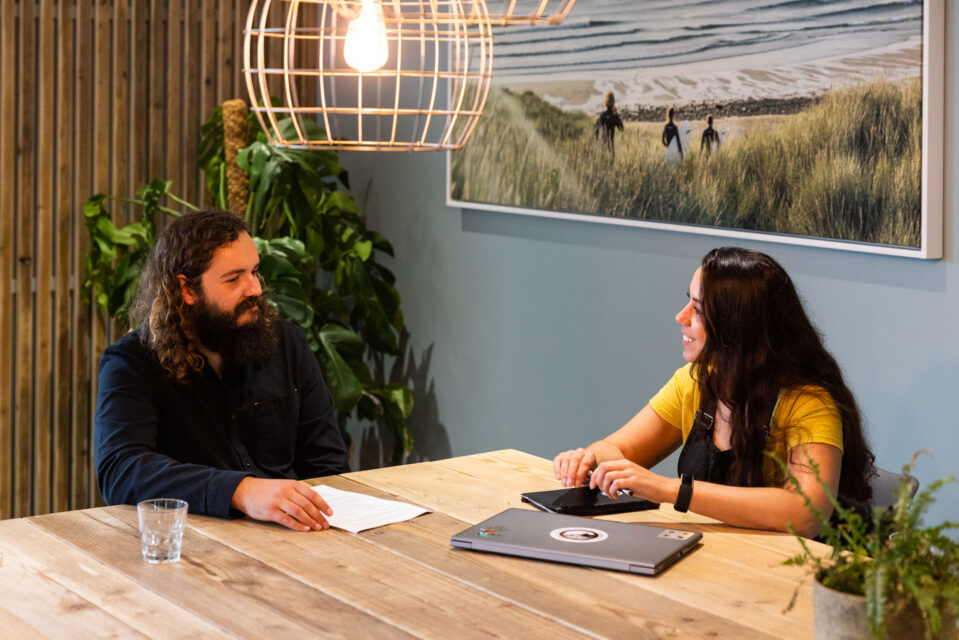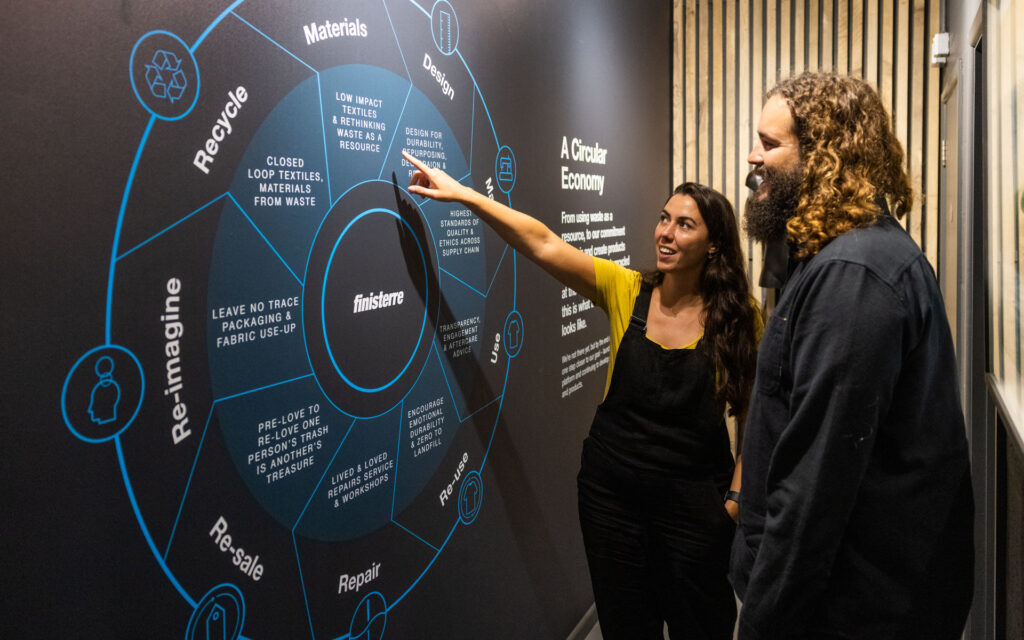“Imagine waste as a resource.”
On the wild north coast of Cornwall near the village of St Agnes, perched high up on the clifftop, is Wheal Kitty Workshops. This is home to Finisterre, the outdoors clothing company that designs functional sustainable kit for anyone who shares a love for the sea.
It’s here on a stormy day that Rob Nunn, a Part 2 Architectural Assistant and Stride Treglown’s Sustainability Champion from the Truro office meets Adele Gingell, Positive Impact Manager for Finisterre. Both dressed in long raincoats, they step inside to talk.

Their conversation is part of a series of discussions and events hosted by Stride Treglown’s regional offices in their Climate Action Relay, an eight-week programme to drive knowledge exchange, best practice and positive action on the climate emergency.
Adele and Rob in their roles have a shared passion for making a difference in their respective industries, and are keen to learn from each other’s experience as Stride and Finisterre are both B Corps.
Companies that are certified B Corporations (B Corps) are dedicated to balancing purpose and profit. This requires them to carefully consider every aspect of what they do, how this influences the people they engage with at all levels, and how their work impacts the environment.
What comes through almost immediately from Rob and Adele is how B Corps have different strengths and can gain valuable insights from others to improve their practice.

Finisterre has always been pioneering in their approach to the circular economy, focused on repairing, recycling and reinventing their products to be more environmentally friendly. As Adele puts it, “Imagine waste as a resource.”
They recently developed a new wind-proof and water repellent bio smock that won an international ISPO award. It’s filled with wool from sustainable farming and is biodegradable at land and in the sea.
Other popular clothing designs are always reworked each year to ensure they are as durable and comfortable as possible, continually improved based on consumer feedback.
They use sustainable materials in their shops, from recycled furniture to decorations sourced outdoors, such as stones and twigs. Finisterre also recently launched their take back approach where customers get store credit for donating back old clothes.


Adele: “We want to make the product last as long as it can for your lifetime and then when it can’t be used anymore, can someone else use it, can it be repaired? What happens to the materials? Can the fabrics be reused?”
“At the end of the day, we are having an impact because we are creating clothing and materials is our biggest impact in terms of carbon footprint.”
Rob: “That’s interesting as it’s something we’re also considering in the architecture industry. We often try to reuse a building or reshape it to improve the efficiencies. You can also sometimes reuse it by grinding up and using the rubble as hardcore and do that process on site.”
“One of our big challenges is materials too, definitely in the building industry, but also how much control we have over what we put into our specifications.”
Adele: “Do you have clients that come to you or vice versa with that desire to only potentially source these kinds of products, like blue sky thinking?”
Rob: “Yes we do but we also see it as an architect’s aim to always add extra value to an idea or project. You can show clients by using better processes, the impact it has had. It doesn’t always add monetary value, but in terms of the longevity of the product or the end user lifecycle analysis, they will benefit from that. In terms of extra investment, some of the most innovative solutions can come from a low budget.”


Rob wants to close the loop more tightly around the circular economy and speaking to Adele has made him further consider the impact of the wider industry and supply chain, learning from Finisterre’s approach.
Meanwhile, another aspect of the B Corp framework, Adele talks about how she sees Stride Treglown’s strength in investing in its people, being an employee-owned company with clear processes and principles around this.
She also values the transparency of Stride’s website and resources, something that fits with her ethos around B Corps.
Adele: “In any industry there’s always going to be an element of competition, it’s what keeps us on our toes. But people are starting to realise, we’re going to achieve a greater goal by sharing.”
Rob: “It’s the same for our industry. We’re moving from a transactional culture of delivering a product or service to having a culture of cooperation and knowledge sharing.”
Adele: “Yes, that learning from others is so important. Open sourcing is becoming so much more of a thing. We have spent the last year developing and improving our HR policies, finding great examples shared by larger B Corps has been invaluable to us. Your website is an example of this.”
The B Corp community can be seen as a hive mind, something to tap into when needed.
In considering how to make small changes to help combat the climate emergency, tangible actions in the office environment can be surprisingly impactful.

Adele: “I met a B Corp that will take your waste electrical equipment and repurpose it. If the wires can’t be used, they get recycled responsibly, but anything that can be repurposed, they will sell at a low cost to community groups, schools, or people that need tech.”
“You wouldn’t normally think of these things day to day. But if you’re always focused on making products sustainable and environmental, you consider what are the small wins? Who is our energy provider in Finisterre stores? Could we recycle more?”
Rob: “Yeah, it’s totally about the marginal gains, too. This year Stride Treglown became carbon neutral in our operation, which has been achieved by years of reduction measures and offsetting through responsible reforestation in Scotland. But it’s also massively impacted by the drop in business travel and thinking about little things like, do I need to make a phone call? Do I need to send that email? You’re using energy for that.”

Rob says that he will continue learning from other B Corps, building on what he already does at Stride Treglown. Following on from the Truro office’s recent beach clean, he intends to continue doing beach clean events with Ward William Associates, another B Corp.
Across the South West, he aims to invite B Corps from differing disciplines to come together and learn from each other in an informal setting, feeding back his learnings to the wider company through the company’s internal sustainability group.
Adele has come to understand the value of community in this way, connecting with others regionally on topics such as the circular economy. Her role is an innovative one, shaped by the B Corp framework, with continual room for growth.
“With every question you answer, you start asking another one. How could we be doing even more to become sustainable? It’s exciting to see where it will take me.”
As a voluntary Sustainability Champion, Rob sees this as a personal project shaping his work.
“It’s important to me to make very small changes and be more particular about where things come from, not just interiors, but the materials that make the spaces.”
“A pilot project I was working on recently, is a zero-carbon school. The cycle hubs have got solar panels and the width of the corridors are optimised to reduce environmental impact. It’s not just token stuff, it’s influenced so many design decisions. Ultimately, the building will form part of the wider vision of community housing. The energy generated here will be put back into the surrounding community.”
“Many architects and builders are going the extra step to find something that works better for them, rather than accepting industry standards. By combining working methods, we can actually achieve something.”
A key insight from delving into the B Corps framework that both have found is the interconnected relationship between people and product. Only by looking at staff, the wider community and the supply chain can you fully enact sustainability.


It’s inspiring how Rob and Adele are both driven to make the people they work with flourish and protect the local landscapes all around them, including the vast sea, just a walk away from where they meet.
Crucially, they are both always open to learning and adapting their ways of working. As Adele points out about the approach at Finisterre,
“We don’t claim to be perfect. We’re still always on a journey and pull us up on it if you think we’re not doing something right, say that because we’ll explore it like we should, we all need to be doing that.”
Whether structuring a building or designing a coat, it’s important to rethink how it’s sourced, developed and embedded in its surroundings for a life cycle. Individuals like Rob and Adele are leading the way, with these new ways of thinking.
It takes just one action at a time from us all to reverse the incoming tide of climate change, and there’s always more to be done, no matter the industry, to make a difference today.
Find out more about our Climate Action Relay and follow live on Instagram, Twitter, and LinkedIn: #ClimateActionRelay.